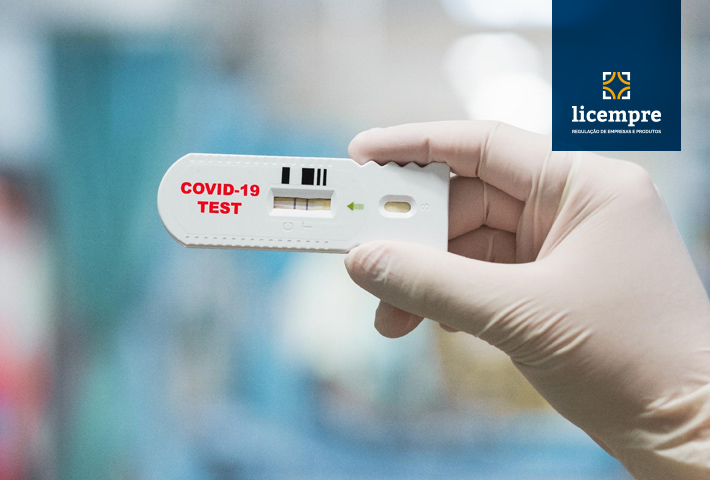
COVID 19 tests are procedures performed to detect whether a person has been infected by the coronavirus or not.
Due to the high contagion and the different forms of manifestation of the disease in the human body, tests are essential to identify the number of people infected.
Rapid tests are incredibly important in combating the pandemic, differing in different characteristics, but all must be duly registered with ANVISA.
See below for more details on COVID 19 testing and how to register this product.
 The COVID 19 tests detect whether the person has been infected or not. (Sars-CoV-2). The COVID 19 pandemic was extremely contagious and the number of regulations for these tests in Brazil had a high demand for registration.
According to Anvisa, only between March and April this year, it has been requested the registration of 157 different tests.
In Brazil, tests vary in relation to the procedure. Some results can be seen in just a few minutes, some may take a few days.
The COVID 19 tests detect whether the person has been infected or not. (Sars-CoV-2). The COVID 19 pandemic was extremely contagious and the number of regulations for these tests in Brazil had a high demand for registration.
According to Anvisa, only between March and April this year, it has been requested the registration of 157 different tests.
In Brazil, tests vary in relation to the procedure. Some results can be seen in just a few minutes, some may take a few days.
 The types of tests available vary. Some may request the use of blood, serum or plants, and others might need to collect samples by airway (nose or throat).
See some types of tests and understand their differences:
The types of tests available vary. Some may request the use of blood, serum or plants, and others might need to collect samples by airway (nose or throat).
See some types of tests and understand their differences:
 Yes. The test must be registered with the regulatory agency, which in Brazil is ANVISA. Sanitary control is the first stage of registration and at this stage the company must present the Authorization for the Operation of the Company (AFE) and Certification of Good Manufacturing Practices (CBPF).
After that, it is necessary to present the information and documents related to the product of interest for registration, such as safety data, clinical studies, production, stability, quality, and effectiveness.
In-house tests, that is, those that are developed in clinical laboratories, also meet ANVISA standards (Resolution of the Collegiate Board – RDC 302/2005). In this case, the tests are not commercialized, their production is exclusively for research, diagnostic support or for the establishment’s own use.
Yes. The test must be registered with the regulatory agency, which in Brazil is ANVISA. Sanitary control is the first stage of registration and at this stage the company must present the Authorization for the Operation of the Company (AFE) and Certification of Good Manufacturing Practices (CBPF).
After that, it is necessary to present the information and documents related to the product of interest for registration, such as safety data, clinical studies, production, stability, quality, and effectiveness.
In-house tests, that is, those that are developed in clinical laboratories, also meet ANVISA standards (Resolution of the Collegiate Board – RDC 302/2005). In this case, the tests are not commercialized, their production is exclusively for research, diagnostic support or for the establishment’s own use.
 Now that you know that tests need registration, see how the process is done with ANVISA.
Registration is carried out in a set of two processes:
Now that you know that tests need registration, see how the process is done with ANVISA.
Registration is carried out in a set of two processes:
 We already know that the registration of tests for COVID 19 is mandatory in Brazil. So that you have total security, agility, and less bureaucracy, Licempre has a team of specialized professionals who will assist your company in all registration processes.
Want to register your product? Talk to our experts
We already know that the registration of tests for COVID 19 is mandatory in Brazil. So that you have total security, agility, and less bureaucracy, Licempre has a team of specialized professionals who will assist your company in all registration processes.
Want to register your product? Talk to our experts
What are COVID 19 tests?
 The COVID 19 tests detect whether the person has been infected or not. (Sars-CoV-2). The COVID 19 pandemic was extremely contagious and the number of regulations for these tests in Brazil had a high demand for registration.
According to Anvisa, only between March and April this year, it has been requested the registration of 157 different tests.
In Brazil, tests vary in relation to the procedure. Some results can be seen in just a few minutes, some may take a few days.
The COVID 19 tests detect whether the person has been infected or not. (Sars-CoV-2). The COVID 19 pandemic was extremely contagious and the number of regulations for these tests in Brazil had a high demand for registration.
According to Anvisa, only between March and April this year, it has been requested the registration of 157 different tests.
In Brazil, tests vary in relation to the procedure. Some results can be seen in just a few minutes, some may take a few days.
What types of tests are available?
 The types of tests available vary. Some may request the use of blood, serum or plants, and others might need to collect samples by airway (nose or throat).
See some types of tests and understand their differences:
The types of tests available vary. Some may request the use of blood, serum or plants, and others might need to collect samples by airway (nose or throat).
See some types of tests and understand their differences:
- RT-PCR: it is considered the gold standard in the diagnosis of COVID-19, whose confirmation is obtained through the detection of the SARS-CoV-2 RNA in the analyzed sample, preferably obtained from nasopharyngeal scraping;
- Serology: Serology, checks the body’s immune response to the virus. This is done by detecting IgA, IgM and IgG antibodies in people who have been exposed to SARS-CoV-2. In this case, the test is performed from the patient’s blood sample;
- Rapid tests: Two types of rapid tests are available: antigen tests (which detect proteins in the infection activity phase) and antibodies tests (which identify an immune response of the body in relation to the virus). The advantage of these tests would be to obtain quick results for the conduct decision.
Do tests need registration?
 Yes. The test must be registered with the regulatory agency, which in Brazil is ANVISA. Sanitary control is the first stage of registration and at this stage the company must present the Authorization for the Operation of the Company (AFE) and Certification of Good Manufacturing Practices (CBPF).
After that, it is necessary to present the information and documents related to the product of interest for registration, such as safety data, clinical studies, production, stability, quality, and effectiveness.
In-house tests, that is, those that are developed in clinical laboratories, also meet ANVISA standards (Resolution of the Collegiate Board – RDC 302/2005). In this case, the tests are not commercialized, their production is exclusively for research, diagnostic support or for the establishment’s own use.
Yes. The test must be registered with the regulatory agency, which in Brazil is ANVISA. Sanitary control is the first stage of registration and at this stage the company must present the Authorization for the Operation of the Company (AFE) and Certification of Good Manufacturing Practices (CBPF).
After that, it is necessary to present the information and documents related to the product of interest for registration, such as safety data, clinical studies, production, stability, quality, and effectiveness.
In-house tests, that is, those that are developed in clinical laboratories, also meet ANVISA standards (Resolution of the Collegiate Board – RDC 302/2005). In this case, the tests are not commercialized, their production is exclusively for research, diagnostic support or for the establishment’s own use.
How does the test registration with ANVISA work?
 Now that you know that tests need registration, see how the process is done with ANVISA.
Registration is carried out in a set of two processes:
Now that you know that tests need registration, see how the process is done with ANVISA.
Registration is carried out in a set of two processes:
- CBPF: Request for all documents related to the manufacturer of the product, whether national or international. The analysis of all documents is made, the preparation of the process and petition with the Anvisa system. Issuance of the fee and the form for the protocol, and the payment of fees and signature of the form is done through the process protocol and the issue of the control number.
- IVD Registration: Request for all documents related to the product, be it national or international. The analysis of all documents is made, the process of elaboration and petition with the Anvisa system. Issuance of the fee and the form for the protocol, and the payment of fees and signature of the form is done through the process protocol and the issue of the control number.
Why register with Licempre?
 We already know that the registration of tests for COVID 19 is mandatory in Brazil. So that you have total security, agility, and less bureaucracy, Licempre has a team of specialized professionals who will assist your company in all registration processes.
Want to register your product? Talk to our experts
We already know that the registration of tests for COVID 19 is mandatory in Brazil. So that you have total security, agility, and less bureaucracy, Licempre has a team of specialized professionals who will assist your company in all registration processes.
Want to register your product? Talk to our experts 

